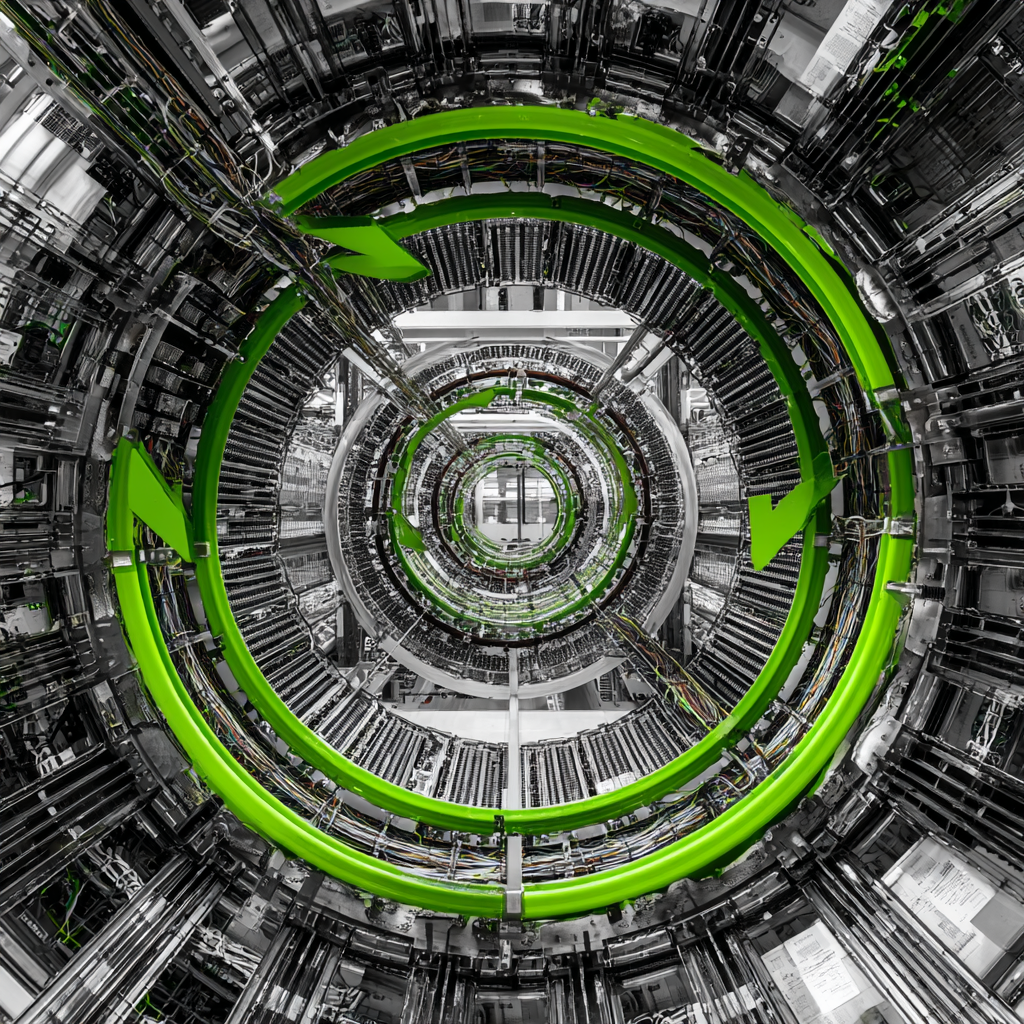Green Tech Revolution: How Technology Is Shaping a Sustainable Future
Preface
Green Tech or Green Technology refers to a kind of technology that depends on its supply chain or production process and is considered ecologically friendly. It refers to the utilization of creativity and science to reduce environmental damage and advance sustainable technology. It's a wide term that encompasses measures that promote ecological balance, reduce pollution, and converse energy.

Green Tech Revolution: How Technology Is Shaping A Sustainable Future
In recent years, sustainability is not just a catchphrase but it became a center stage in the tech industry. Imagine a world where factories can operate without endangering the environment, cars only emit water vapour, and cities breathe fresh & clean air. It is not just a dream but this is the idea underlying the Green Tech Revolution.
Tech firms are rapidly employing green practices, promoting revolution in green technology, and matching their operations with sustainable principles as environmental problems increase and consumers want more eco-friendly products.The way we utilize technology to cure this planet is changing drastically, from biodegradable materials and renewable energy systems to AI driven energy efficiency and smart agriculture.
This blog talks about how the industry is changing due to the green tech revolution, the increase of green tech startups, and how professionals should understand the expansion of intersection between technology and environmental responsibility.
What is Green Tech?
Green Tech or Green Technology refers to a kind of technology that depends on its supply chain or production process and is considered ecologically friendly. It refers to the utilization of creativity and science to reduce environmental damage and advance sustainability. It’s a wide term that encompasses measures that promote ecological balance, reduce pollution, and converse energy.
This Involves renewable energy systems, Energy efficient appliances and buildings, Eco friendly manufacturing, carbon capture and reuse, Electric mobility, sustainable agriculture powered by tech. Cleantech, which particularly refers to goods or services that enhance operational effectiveness while simultaneously lowering expenses, energy use, waste or adverse environmental effects, is connected to green tech.
Utilizing green technology may be a company’s or a business segment's declared objective. These objectives are usually stated in a company’s mission statement or in its environmental, sustainability, and governance (ESG) statement. Socially conscious investors are increasingly trying to limit their potential investments to just businesses that use or manufacture green technologies.
How Technology Is Helping To Create A Sustainable Future
Technology is becoming the foundation of climate action and is no longer simply about connectivity and convenience. Here’s how:
Smart Grids And Clean Energy Systems
If we compare today’ s wind turbines and solar panels with the wind turbines and solar panels of ten years ago, we find that the current models are more efficient. As per the International Energy Agency, stated that in 2024, 90% of new power capacity globally came from renewable sources, a notable growth driven by investments in green infrastructure. Cleaner and more reliable energy distribution is ensured by smart grids and advanced battery storage technologies.
AI & Data Driven Sustainability
AI plays a vital role utilizing energy use, anticipating spikes in demand, spotting environmental consequences, and blocking natural catastrophes like forest fires etc. Additionally, food waste reduction, supply chain optimization, and waste management are being enhanced by machine learning models. Technology also makes it possible to gather and analyse environmental data, which serves as the basis for well informed choices and extensive sustainability planning.
Smart Cities & IoT
Smart cities reanalyzed by smart cities. Countries like Singapore and Amsterdam are already using the technologies like IoT Sensors and gadgets to promote water conservation, control the traffic and to keep an eye on pollution levels, which helps to lower the emissions, increase the quality of life, and advance long term sustainability devices.
Eco Friendly Transportation & Logistics
As the transportation industry is slowly stepping into the green revolution practices, businesses like DHL and other Indian organization Seros Logistics committed to going green for better environmental sustainability by empowering its facilities through renewable energy sources. Electric vehicle fleets are becoming more common in last mile logistics, and technologies like real time route optimization and predictive maintenance help cut down on emissions and idle time.
Low Energy Software & Sustainability Manufacturing
The sensors are becoming used by factories to monitor waste, pollutants, and energy consumption in real time. Production is becoming cleaner and more effective due to robotics and additive manufacturing like 3D printing. At the same time, there is a demand for energy efficient coding due to the growth of high performance applications and public cloud computing. Writing low power software that reduces computational needs is increasingly a challenge for developers, especially in edge computing contexts.
Blockchain For Paperless Operations
It provides a sustainable method for conventional procedures that rely heavily on paper. It eliminates the necessity of printing, scanning and physical storage by providing clear, unchangeable, digital contracts. Particularly in industries like finance, human resources, and law that depend on document heavy procedures, this change not only increases productivity but also dramatically reduces environmental effect.
The Shift Towards Sustainable Practices In Tech
Green Data Centers
Most of the tech giants like Google, Microsoft, and AWS are shifting to 100% renewable energy. Surpassing impartiality to eliminate more carbon than its emissions, Microsoft has taken a vow to be carbon negative by 2030. With the help of AI, cooling systems, once infamous energy guzzlers, are now being optimized. For example, Google cut down the energy to cool its data centres by 30% with the help of DeepMind AI.
Eco-Conscious Hardware
Tech firms like Fairphone prioritizing modular, and repairable designs which allow consumers to enhance or repair their phones easily reducing e waste. Apple’s Daisy robot deconstructs old devices for recycling.
Green Coding & Sustainable Software
The field of energy efficient coding is expanding. Programmers are learning how to create apps that consume the least amount of CPU time, which lowers energy consumption in edge and cloud computing.
Supply Chain Transparency
To monitor carbon footprints throughout their supply chains, highlight high impact areas, and enhance sourcing practices companies are using block chain and technology and real time analytics. This transition from linear to sustainable operations is now required; it is both a social obligation and social vintage.
The Rise Of Green Tech Startups
Startups are bridging a gap of innovation by launching disruptive, eco-friendly technologies as the global demand for sustainability grows.
Climate Works
A Switzerland based organization Climate works AG sponsored by organizations like Stripe and Microsoft develops Direct Air Capture (DAC) systems that eliminate CO₂ from the atmosphere and stock it underground.
Solugen
An USA based chemical company called Solugen delivers eco-friendly chemicals using sugar rather than petroleum by combining chemistry and biology to combat climate change. This could revolutionize how industrial materials are made.
Heirloom
An USA based Direct Air Capture company called Heirloom gets friction for its simplicity and sustainability by using the minerals to pull CO₂ from the atmosphere in a low-cost, flexible and natural way.CarbonCure
CarbonCure is a Canada based cement and concrete company capturing the concrete and cement industry world wide by injecting recycled CO₂ into concrete during mixing to reduce the carbon footprints, which leads to a stronger and greener building material.
Agreena
A Europe based leading soil programme Agreena bridges the gap between agriculture and fintech for sustainability by educating farmers to acquire regenerative practices and earn carbon credits using digital platforms.
These startups are not only solving the environmental issues, they are also creating an entire ecosystem of green value. According to PwC, globally between 2021 to 2024 climate tech startups attracted over $70 billion in VC funding.
What Tech Professionals Need To Know Towards Green Tech Revolution?
Professionals in all tech fields need to adjust as the Green Tech revolution gains traction. Regardless of your field—software, engineering, design, or data—sustainability now affects your work.
Recognize ESG
Environmental, social, and governance (ESG) objectives are becoming crucial for businesses. Experts who comprehend ESG metrics and know how to match sustainability objectives with technology strategy are increasingly valuable.
Construct with Intention
While creating devices, apps and infrastructure, The question to ask is, "How can the product be created more sustainable?" Life Cycle analysis and design thinking are becoming commonplace instruments in product development.Discover New Resources
- Carbon accounting software (such as Persefoni or Watershed)
- Platforms for energy optimization (like GridPoint)
- Cloud computing that is sustainable (such as Google Cloud's Carbon-Aware Computing)
A Career in Green Technology
In recent days, Most of the professionals are working in positions like climate data scientist, sustainability analyst, and green infrastructure engineer. Professionals with climate literacy and eco-design experience are more in demand.
In the end, being aware of and active in sustainability initiatives is not only beneficial for the planet but also beneficial for the individuals.
Conclusion
The Green Tech Revolution is transforming the world more quickly than ever before. Initially it began as a niche sector and now has become a global fundamental. The change is visible, and motivating. From Big Techs reimagining how we power the internet to startups disrupting concrete and agriculture.
For people, it means matching lifestyle choices with sustainable solutions. While merging green goals into strategies are crucial for businesses. And, for professionals it’s all about consistent innovation, learning and adapting to a purpose driven mindset.
Though technology is making lives easier it has raised the environmental challenges we face today. In this critical moment, the world needs a greener tech not just a smarter tech. And it begins with each and every individual by taking conscious decisions, following the environment related guidelines, generating useful goods, and endorsing systems that put the planet first.
The sustainable future is being constructed, line by line, circuit by circuit, and innovation by innovation; it is not simply coming. Let us ensure that we are on the correct side of that revolution.
The sustainable future is being built cricut by cricut, innovation by innovation and line by line it’s not simply coming. Let’s ensure we are on the right path towards the revolution.


